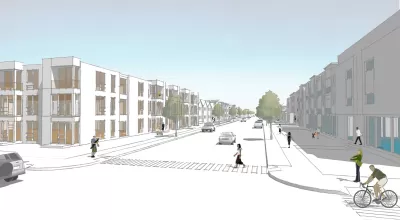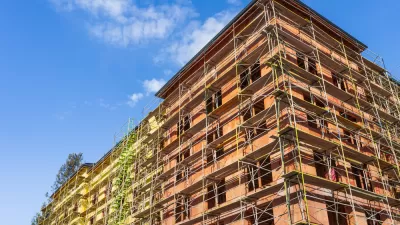A recent study surveyed 800 jurisdictions in 50 U.S. metropolitan areas to quantify the amount of change in zoning regulations throughout the 21st century so far.

Research published in June by the Journal of the American Planning Association examined zoning changes in major U.S. metropolitan areas from 2003 to 2019, finding that zoning grew more accommodating to apartments in strong-market metro areas over that time period.
In addition to the abstract, which is available online, the researchers—Rolf Pendall, Lydia Lo, and Jake Wehmann—provide this "takeaway for practice":
Local land use planners in the United States have ethical and legal obligations to undo the racial segregation designed into zoning from its founding. They also must prepare for continued population growth. Tools and strategies exist to do both of these, and some planners have the commitment and political space to use them. In other places, planners and their professional organizations need to change rules within their own communities and advocate for state legislative reforms so that planning works predictably to unwind unequal and exclusionary settlement patterns within neighborhoods and cities.
The study's abstract suggests that the findings function as a counter-narrative to opinions of pundits and economists that zoning explains housing price inflation in fast-growth metro areas. This research shows the limitation fo the narrative, according to the authors.
For more of the ongoing debate about zoning's role in the housing market, and attempts by local jurisdiction to create more affordable housing supply by loosening zoning restrictions on multi-family housing, see the collection of articles flied under Planetizen's Zoning Reform tag.
The article's abstract and a link to the (paywalled) study is available below. To access some of the research without a paywall, see also a follow up brief built on the original study, recently published by the Urban Institute and written by Patrick Spauster, Lydia Lo, and Yonah Freemark.
FULL STORY: Shifts Toward the Extremes

Alabama: Trump Terminates Settlements for Black Communities Harmed By Raw Sewage
Trump deemed the landmark civil rights agreement “illegal DEI and environmental justice policy.”

Planetizen Federal Action Tracker
A weekly monitor of how Trump’s orders and actions are impacting planners and planning in America.

The 120 Year Old Tiny Home Villages That Sheltered San Francisco’s Earthquake Refugees
More than a century ago, San Francisco mobilized to house thousands of residents displaced by the 1906 earthquake. Could their strategy offer a model for the present?

LA’s Tree Emergency Goes Beyond Vandalism
After a vandal destroyed dozens of downtown LA trees, Mayor Karen Bass vowed to replace them. Days later, she slashed the city’s tree budget.

Sacramento Leads Nation With Bus-Mounted Bike Lane Enforcement Cameras
The city is the first to use its bus-mounted traffic enforcement system to cite drivers who park or drive in bike lanes.

Seattle Voters Approve Social Housing Referendum
Voters approved a corporate tax to fund the city’s housing authority despite an opposition campaign funded by Amazon and Microsoft.
Urban Design for Planners 1: Software Tools
This six-course series explores essential urban design concepts using open source software and equips planners with the tools they need to participate fully in the urban design process.
Planning for Universal Design
Learn the tools for implementing Universal Design in planning regulations.
Ada County Highway District
Clanton & Associates, Inc.
Jessamine County Fiscal Court
Institute for Housing and Urban Development Studies (IHS)
City of Grandview
Harvard GSD Executive Education
Toledo-Lucas County Plan Commissions
Salt Lake City
NYU Wagner Graduate School of Public Service





























